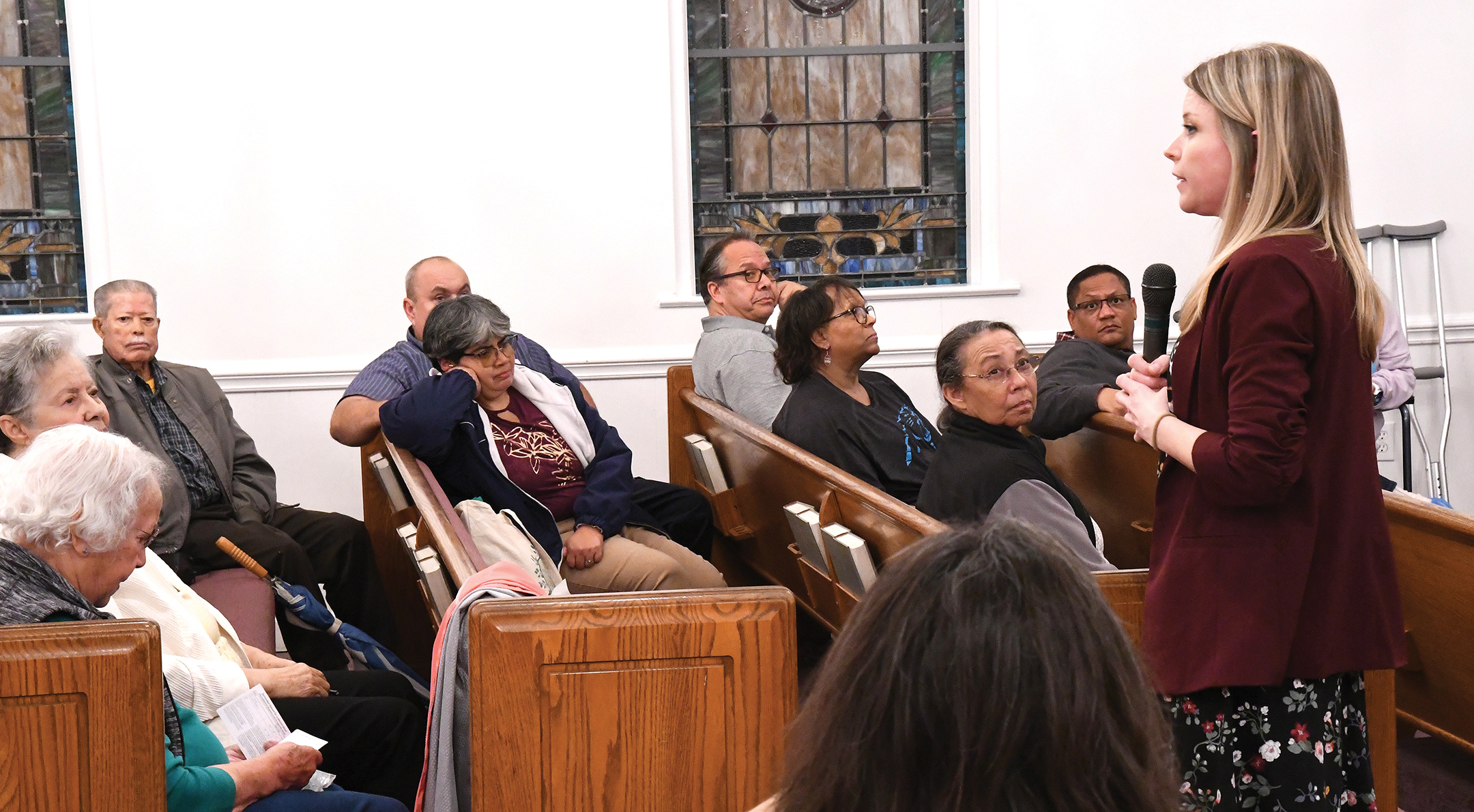Campbell programs reach out to Coharie Tribe to improve health outcomes in underserved area
Should his career in public health ever go awry, Dr. David Tillman has a future as a Baptist minister. Confident, enthusiastic and a careful storyteller, Tillman looked at home standing before the congregation at New Bethel Baptist Church on this unusually warm January evening (so warm, in fact, a tornado warning would serve as the night’s only hiccup).

In front of a few dozen members of the congregation — most of them members of the Coharie Tribe of American Indians, whose headquarters is a stone’s throw away in northern Sampson County — Tillman shares the story of picking up his then 6-year-old daughter from a friend’s birthday party and noticing a zipline set up in the backyard. He asked her if she took part in the fun, and she told him, “No, it looked too scary.”
Always up for a teachable moment, Tillman told his daughter to be brave and face her fears. Inspired by his words, she got in line for the zipline and took the leap. Tillman couldn’t have been prouder.
“If only the story had ended there.”
The sweat from his daughter’s hands — likely from her initial anxiety — caused her hands to slip from the handle, and his daughter dropped to the ground. She would spend the rest of that summer in a wrist cast, unfortunately. It wasn’t the happy ending or the lesson Tillman had expected, but there was a lesson to be learned.
“The lesson is this — I’m not going to repeat that same mistake tonight,” Tillman told the group. “I learned it from my daughter and many times since, I’m not here to make you or to convince you to do anything you don’t want to do. And I know this is a really difficult time to know who to trust or what to believe, because we’re getting all kinds of different information from different places. Our world is polarized and divided.
Photo above: Dr. David Tillman, chair of the College of Pharmacy & Health Science’s Public Health program, led efforts to educate members of the Coharie Tribe community on COVID-19 and vaccinations as part of a grant from Interfaith America and the Duke Endowment. Photo by Ben Brown
“We’re here to talk about vaccines, and we hope that you feel comfortable asking questions and getting answers from people you can trust — people that have been here and will continue to be in your community.”
The “we” included Dr. Amy Hinkelman, assistant professor of microbiology and immunology for the Jerry M. Wallace School of Osteopathic Medicine. She joined Tillman, professor and chair of Campbell’s Public Health department, in January to offer her expertise on the COVID virus and vaccinations and to answer questions and debunk a host of myths and misinformation. Their appearance — and the meal and door prizes provided that night — were made possible by a grant from Interfaith America and the Duke Endowment.
It was also part of a much larger outreach program by Public Health, the med school and other health science programs to reach the Coharie — one of eight state-recognized tribes in North Carolina — and provide care and education to the medically underserved rural part of the state.
Outreach efforts have included mailed flyers, door-to-door visits and automated calls regarding vaccinations, clinics and other COVID-19 information. Tillman and Hinkelman have also joined health experts from the American Indian community such as Dr. Ronny Bell of the Lumbee Tribe and Dr. Linwood Watson of the Haliwa-Saponi Tribe to provide familiar faces so members of the community are comfortable to ask difficult questions. Mobile units have also visited Coharie headquarters to provide on-site vaccinations.

The efforts are important, Tillman said, as Native American communities across the country faced disproportionate rates of infection, hospitalization and death in the first two years of the pandemic. The susceptibility had roots in longstanding distrust caused by 250-plus years of federal neglect and marginalization.
Tillman and Hinkelman know that to change that, it takes more than a one-time visit. Earning trust means being present and learning cultures, listening and sharing personal stories and being honest.
“I’m a little tired of COVID, too,” Hinkelman said in her opening statement to the group. “But the reality is, it’s here to stay. It’s changing us, and because it’s changing us, that means it’s still relevant, right? It’s still making people sick; sick enough that they’re still ending up in the hospital. And it’s doing strange things to people long-term, which is something we’re trying to better understand. It’s definitely still relevant, and the data indicates there’s a lot of benefit to being vaccinated.”
Their January visit not only touched on vaccinations and long COVID, but the flu and respiratory syncytial virus (RSV) as well. Questions from the group ranged from booster efficiency to proper diets. The Q&A session alone went nearly an hour.
The New Bethel visit marked the “finale” of the work funded by Interfaith American and the Duke Endowment, but it’s by no means the end of the relationship. This year, the Lundy-Fetterman School of Business will launch a program in conjunction with the N.C. Commission of Indian Affairs to train tribal administrators to become better overall leaders. And Tillman said Campbell’s health science programs and Divinity School will continue to serve people in the region.
Coharie Tribal Administrator Greg Jacobs said Campbell’s presence in his community means a lot to him. “Having this opportunity to receive expert information and support in our own facilities makes us feel like an important part of society,” he said. “Historically, we have been invisible due to our small numbers. This is a great opportunity to be visible. It feels really good and gives us a sense of belonging.”

